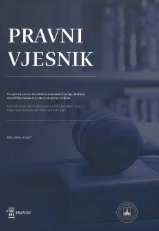RAZVOJ KONCEPTA NEOPRAVDANOG OBOGAĆENJA U RECEPCIJI RIMSKOG PRAVA
DEVELOPMENT OF THE UNJUSTIFIED ENRICHMENT IN THE RECEPTION OF ROMAN LAW
Author(s): Henrik-Riko HeldSubject(s): History of Law, Ancient World, Socio-Economic Research
Published by: Pravni fakultet Sveučilišta Josipa Jurja Strossmayera u Osijeku
Keywords: unjustified enrichment; unjust enrichment; condictio; actio de in rem verso; Roman law; reception of Roman law;
Summary/Abstract: The author in this article analyses the development of the unjustified (unjust) enrichment as a general and an independent source of obligations on the basis of Roman law. Although such a concept admittedly did not exist in Roman law, certain actions therefrom were largely used in the formative period of the civil and canon law scholarship in the Middle Ages, as well as in the subsequent reception of Roman law at the courts in continental Europe. On that basis contemporary theoretical analyses and case law often use Roman legal terminology in the context of unjustified enrichment (condition and different conditioners, actio de in rem verso, etc.). The aim of this analysis is to propose a contribution to a more complete and a more accurate appreciation of the connection between actions from Roman law and the formation of the concept of unjustified enrichment, and with that also their connection and relevance in a con- temporary context. Accordingly, the general development in the Middle Ages is the first part of the analysis, followed by two basic different tendencies in the development. One of them is associated with the French law, where Roman actio de in rem verso had an important role in the development of the unjustified enrichment law. The other is related to the German law, which is in this respect based on Roman conditioners. Besides, the English common law and the historical Hungarian private law, or the private law of the Tripartitum in its application in the Kingdom of SHS, or the Kingdom of Yugoslavia, are also analysed as examples of the systems originally unrelated to Roman law in this regard, but experiencing strong influence later on, principally by means of systems more strongly shaped on the basis of Roman conditioners. Conclusive remarks discuss the general presence of Roman law in the development of unjustified enrichment law and in its contemporary variants, as well as the optimality of the systems more authentically based on Roman legal sources.
- Issue Year: 35/2019
- Issue No: 3-4
- Page Range: 201-221
- Page Count: 21
- Language: Croatian

